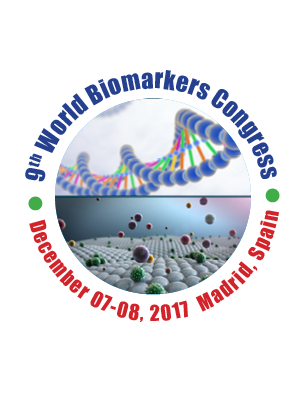
Varda Shoshan-Barmatz
Ben-Gurion University of the Negev, Israel
Title: Novel biomarker proteins for cancer: Impact on diagnosis, prognosis and treatment
Biography
Biography: Varda Shoshan-Barmatz
Abstract
Cancer cells undergo re-programing of metabolism, cell survival and anti-apoptotic defenses, with the proteins mediating these re-programing representing potential biomarkers. Here, using specific antibodies, mass spectrometry and bioinformatics tools; we searched for novel biomarker proteins in chronic lymphocytic leukemia (CLL) and in non-small cell lung cancer (NSCLC) patient samples that can impact diagnosis, treatment and prognosis. By comparing protein expression profi les of CLL- and healthy donorderived lymphocytes, we identified 1,360 diff erentially expressed proteins, some shown for the first time to be associated CLL. Downregulated expression of two proteins resulted in cell growth inhibition, pointing to their essential functions. Based on changes in the levels of several proteins in CLL patients, we could distinguish between patients in a stable disease state and those who would be later subjected to anti-cancer treatments, 2-3 years before the physician’s decision. In NSCLC, the adenocarcinoma (AC) and squamous cell carcinoma (SCC), sub-types present unique genomes, transcriptomes, and proteomes, and share clinical and histopathological characteristics, yet diff er in treatment. We identifi ed novel biomarker proteins in NSCLC, with 378 proteins showing a ≥|100|-fold change in level. Several, identifi ed for the fi rst time, allow for distinguishing between AC and SCC. These, together with markers previously proposed and confi rmed here, lead us to propose a list of proteins for discriminating SCC and AC, with four being secreted. Precise diagnosis of AC and SCC is essential for selecting appropriate treatment. Finally, some of these biomarkers can serve as new targets and lead to new treatments for lung and CLL cancers.

